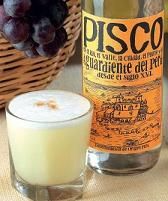Pisco is a Peruvian city, capital of the province of the same name, which is part of the department of Ica . The Nazcas and the Paracas resided in this territory before the arrival of the Spanish conquistadors, who developed an important port in the area.
 Today Pisco is a town known throughout the world for its closest tourist attractions, such as the Paracas National Reserve or the historical ruins of Tambo Colorado . However, the symbol of Pisco is a drink that is produced in the area and is known, precisely, as pisco .
Today Pisco is a town known throughout the world for its closest tourist attractions, such as the Paracas National Reserve or the historical ruins of Tambo Colorado . However, the symbol of Pisco is a drink that is produced in the area and is known, precisely, as pisco .
Pisco is a grape brandy that originated in the 16th century . The juice from the grapes is distilled in stills made of copper and then fermented. It is usually drunk as an aperitif or used to prepare various drinks or cocktails (such as pisco sour , which contains pisco, lemon juice and other ingredients).
It should be noted that another alcoholic drink is known as Chilean pisco , in this case a brandy made from other types of grapes. For many years, Chile and Peru have had a dispute over the designation of origin of pisco.
Specifically, Peruvian pisco is made with Quebranta, Muscat, Negra Corriente, Uvine, Torontel, Mollar, Italia and Albilla grapes. While Chilean pisco is prepared with Muscat, Pedro Jiménez and Torontel grapes.
It is interesting to note that this Chilean drink has the privilege of having the oldest designation of origin in the country and in all of South America. Currently, more than 100 million liters are produced per year, of which a part is exported to the United States and Europe.
It is important to highlight that, beyond these meanings, pisco is a Quechua term that can be translated as “bird.” For this reason, in some regions, it is used to name certain species of these animals, such as turkeys .
However, we cannot forget the existence of geographical features and places in different corners of the world that are also known by the same name of Pisco. Among these is, for example, the Pisco River, which is from Peru and flows into the Pacific Ocean, or the Sierra de Pisco, which is located in Portugal, more precisely in the district of Guarda.
There is also Pisco Elqui. This is a term used to refer to a town in Chile that has become one of the enclaves with the greatest tourist interest in the entire Elqui valley. It is located 1,300 meters above sea level and, in addition to its natural beauty, it offers visitors the possibility of visiting one of the most important and oldest distilleries in the area: Solar de Pisco Elqui.
Finally, in several of the provinces of the autonomous community of Andalusia, in Spain, the term pisco is used to refer to a speck or crumb that is small in size.
